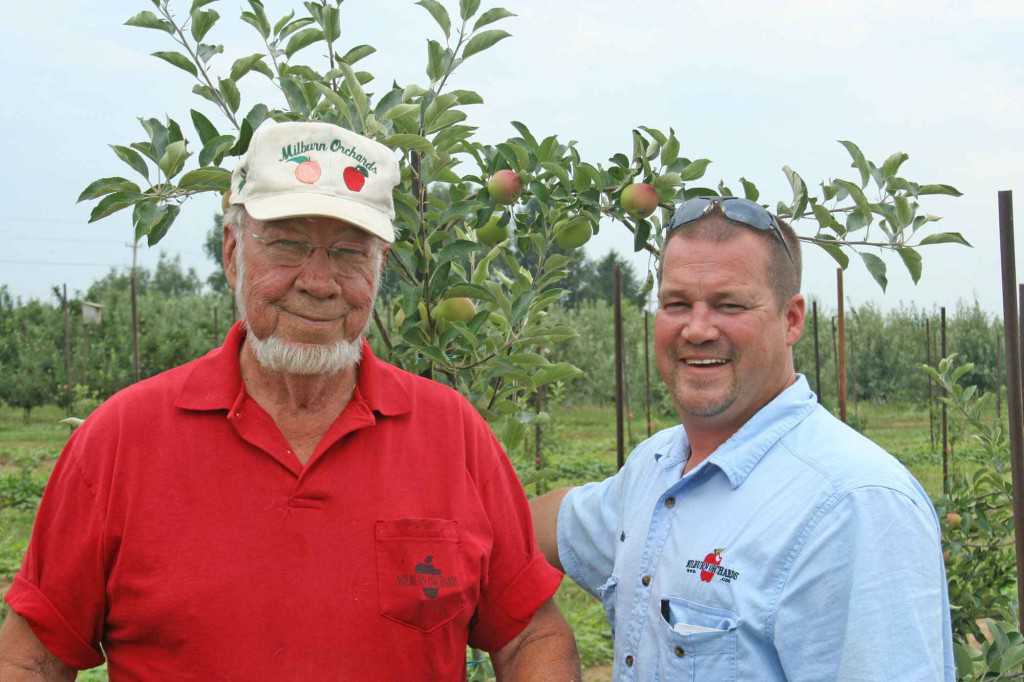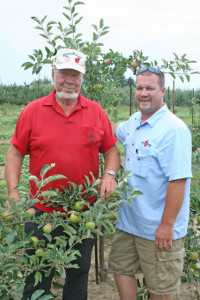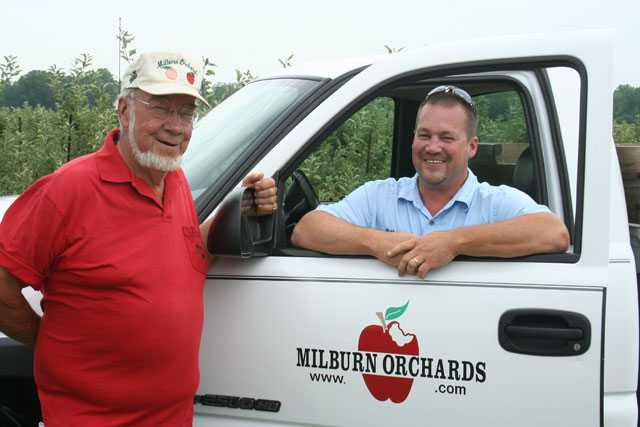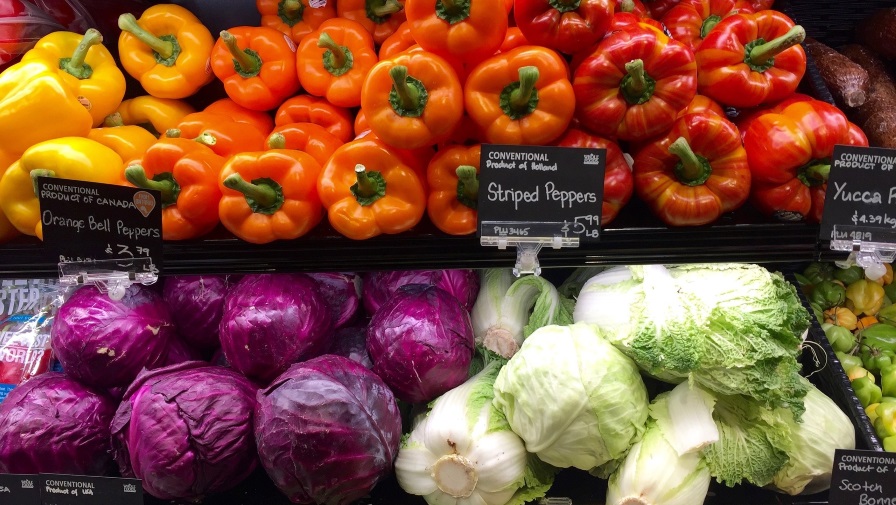Apple Growers Of The Year: A Legacy Built By Family
 There may not be a better way to celebrate the 20th anniversary of the Apple Grower of the Year award program than by honoring two individuals who have dedicated their entire lives to farming. Evan and Nathan Milburn have spent years building the legacy of a family farm, being proactive in responding to an ever-evolving industry, and taking the necessary steps to make sure that Milburn Orchards in Elkton, MD, is as successful 100 years from now as it was when it first opened its doors more than 100 years ago.
There may not be a better way to celebrate the 20th anniversary of the Apple Grower of the Year award program than by honoring two individuals who have dedicated their entire lives to farming. Evan and Nathan Milburn have spent years building the legacy of a family farm, being proactive in responding to an ever-evolving industry, and taking the necessary steps to make sure that Milburn Orchards in Elkton, MD, is as successful 100 years from now as it was when it first opened its doors more than 100 years ago.
As a father-son team, Evan and Nathan work together not only as partners, but as friends. They are able to learn from each other, yet have a clear paternal relationship, with Nathan heeding his father’s wisdom (and his own experiences) on what it takes to keep the business moving forward successfully, and Evan making sure that forward direction never veers off course. While officially Evan and Nathan might be known as “consultant” and “orchard manager,” titles don’t mean much at Milburn Orchards; what’s more important is working together to build your future, without losing sight of the past.
A Family Affair
The history of Milburn Orchards was covered in the May 2005 issue of American and Western Fruit Grower, as part of a “Centennial Growers” series. As Evan notes, one of the trucks that he and Nathan drive around the orchard has a bumper sticker that reads “Born To Farm.” That is certainly true in his case.
“When I was young, I wanted to become either a preacher or a fruit grower,” Evan says. “I made the right choice.”
Evan learned the basics of fruit growing from his father, John.
“He was a very progressive grower in his time, and taught me the work ethic that my son and I have today,” he says.
Nathan is proud to say that he learned just about everything he knows from his father.
“I grew up like a tick on my father’s leg,” he says.
While he did not attend college, Nathan cites his education in the field for getting to where he is today.
“What I gained working side by side with my father, I couldn’t have learned in a classroom,” he says.
Today Nathan works tirelessly to make sure Milburn Orchards is keeping up with the rest of the apple industry. And that’s not an exaggeration — the interview for this story followed a long night of spraying for Nathan, which was to be followed by harvesting both cherries and peaches the next day.
 Shifting To Retail
Shifting To Retail
Around 20 years ago, Evan says, Milburn Orchards allocated 90% of its then 250 acres of apples for the wholesale market, and 10% for retail. Today, the apple acreage has been cut back to 150 acres to account for a new selling structure: it’s now 60% retail, 20% pick-your-own, and 20% packing and shipping.
“Our goal is to eliminate all wholesale,” says Evan. “Why? There simply isn’t the markup we have to have in order to stay in business.”
The Milburns recognize that competing with larger growers in New York, Michigan, and Washington, who can provide fruit throughout the year, is a challenge.
“When you can’t run with the big dogs, get back up on the porch,” Evan quoting an old saying.
But don’t assume this puts them at a disadvantage; in fact, the opposite is true. Milburn Orchards is located approximately 45 miles from both Philadelphia and Baltimore, and it’s not too much further from New York City and Washington, DC.
“We are plagued by being overpopulated, so we thought we’d take advantage of it,” says Evan.
This market shift affects not only how the Milburns sell their fruit, but how they grow it.
“We are a completely pedestrian orchard,” says Evan, which means ladders are not required.
All trees are budded on M.9 337, and all are kept at 7 to 8 feet in height and planted at 6-feet-by-14-feet. In addition, each tree has a steel post, as opposed to a single-wire trellis system. It’s more expensive, but with the farm on the edge of where strong hurricane winds can blow through.
“It’s the only way we can go here,” says Evan.
The pedestrian approach has another advantage.
“We are concentrating on quality versus yield, and have found that the pedestrian orchard doesn’t yield quite as much, but the quality is kept very high,” says Evan.
Not only does all the fruit get sunlight, but with shorter trees, labor is easier.
The Milburns also have more land set aside for agritainment.
“We’re going more into farm entertainment,” says Nathan. “And it will keep getting larger, because more people today want to see a family farm.”
In fact, more than 20 acres is devoted to an extensive agritainment and parking area, with upwards of 6,000 people coming out to the farm on weekends during the fall.
 Higher Learning
Higher Learning
Both Evan and Nathan will be the first to admit that there’s a learning curve involved in growing high-quality fruit. That learning experience should ideally take place both in
and out of the orchard. According to Nathan Milburn, trial and error is critical.
“My father tells me all the time to always test new varieties, systems, and chemicals before using them,” Nathan says.
This is why there’s one section of the orchard that is considered a testing block. A few years ago, that block included Honeycrisp, which the Milburns are able to grow despite being closer to a Southern climate. Today, that block consists of many newer variety strains, as well as cherries trained on the Upright Fruiting Offshoots (UFO) system.
“We learn more about what not to plant, than what to plant,” says Evan.
Perhaps more importantly, the education process involves networking with other growers through membership in associations and traveling to events. Both Evan and Nathan are involved not only in Maryland-based organizations, but they are also members of horticulture associations in Pennsylvania, Virginia, West Virginia, Michigan, and Washington. Both are also active members of the International Fruit Tree Association. Aside from this, their industry involvement extends beyond apples — Evan has worked with various variety testing organizations, and Nathan is on the executive council of the North American Raspberry-Blackberry Association. He also credits the Mid- Atlantic Young Grower Alliance as helping move his career forward.
It’s the traveling part that Evan stresses more than anything.
“Probably the most successful thing for me, and the biggest part of my education, is to travel and observe things,” he says. “But don’t just observe. Put what you observe into action. Otherwise you’re just wasting your time and money.”
For example, on a trip to Nova Scotia, Evan picked up the notion of integrated pest management (IPM) and was one of the first growers on the East Coast to use it on their farm.
“It has increased our ability to deliver safe local fruit,” says Nathan.
It was one of Evan’s early influences, Arthur Thompson of the University of Maryland, who first encouraged him to attend a meeting of the International Dwarf Fruit Tree Association back in 1967. Since then, he’s been to several more meetings, served as president, and has met and learned from some outstanding growers and researchers, including Harry Black, Grady Auvil, Don Heinecke, Dave Ferree, and Wally Heuser (“whom I consider the most brilliant horticulturist in the country today, if not the world”).
“Where else could small growers like me, coming from a small state like Maryland, meet the most successful growers and researchers in the world,” says Evan. “It’s influenced my way of thinking from 1967 until now.”
Although he was younger, Nathan remembers attending those meetings with his father.
“Of course, he was having meetings, and I was running up and down the hallways,” he says. “But I knew all these big guys, and was lucky to grow up with them.”
Signs Of The Times
Despite all the time and effort Evan and Nathan devote to improving their operation, there are obviously a number of outside forces that are shaping its future.
• Club/managed varieties:
Nathan is not shy about voicing his concerns.
“Clubs restrict us from putting new things in our test block to see if we can grow them,” he says. “Something has to be worked out so that, as small growers, we can obtain these new varieties.”
He also worries that planting systems themselves could soon become subject to intellectual property rights.
• Labor:
Like everyone else, it’s one of their biggest concerns.
“We saw it coming years ago, and this is another reason why we’re a total pedestrian orchard,” says Evan.
Retaining your labor force is also important.
“Treat your labor with high respect and gratitude. Some people don’t realize that they are the ones making your living and success possible,” says Evan.
Moving Forward
The future growth plan for Milburn Orchards doesn’t exactly involve adding acreage, but rather, it is driven by continued diversification, as well as expansion of the agritainment side of the business. Almost every year, older nonperforming varieties are phased out in favor of new ones. In addition, to capitalize on a customer base that demands a wide selection to choose from, the Milburns make sure they are diversified in the crops they grow and sell. Aside from the 150 acres of apples, the farm also grows 120 acres of peaches and other stone fruit, 20 acres of sweet cherries, 25 acres of pumpkins, and grapes and berries.
The farm also has a webite (www.milburnorchards.com) that is updated frequently, and there’s no shortage of promotion: virtually all signage, logos, or anywhere else where the Milburn Orchards logo appears includes a “dot-com” element. As the apple industry changes, Evan and Nathan Milburn are prepared to change along with it.
“Our future is taking hold by the fourth generation in Nathan, my two nephews (Jay and David), and my niece Melinda,” says Evan.
Meanwhile, Nathan’s 14-year-old daughter Zoe is already involved in the pick-your-own side of the business, and while his son Eli is only 5, “I assume that he’ll be a pretty good boss someday!”
In today’s climate, that’s a comforting thought.
Words To Live By
Evan Milburn’s years of attending industry meetings and perfecting his horticultural and business skills have given him a unique perspective of the apple industry. What follows are a few pearls of wisdom from Milburn.
- “If you think you’re ripe and you already know everything, that’s when you’ll start to rot.”
- “As long as you are curious, you defeat age.”
- “Alone, we can do nothing. Together, we can conquer all.”
- “Never go too deeply into debt. If you can’t afford to do something without going too deeply into debt, don’t do it.”
- “In horticulture, all things have to be done the exact same time they should be. Being late is not an option in growing fruit.”
- “If you can’t do it right, don’t do it at all.”
- “Treat each and every customer as a VIP, even if they complain about something.”










